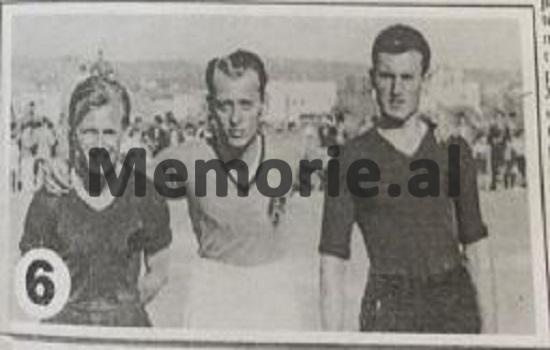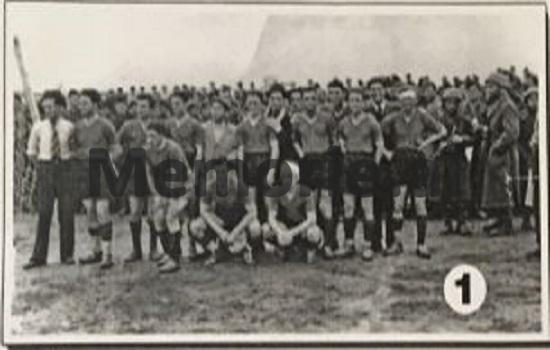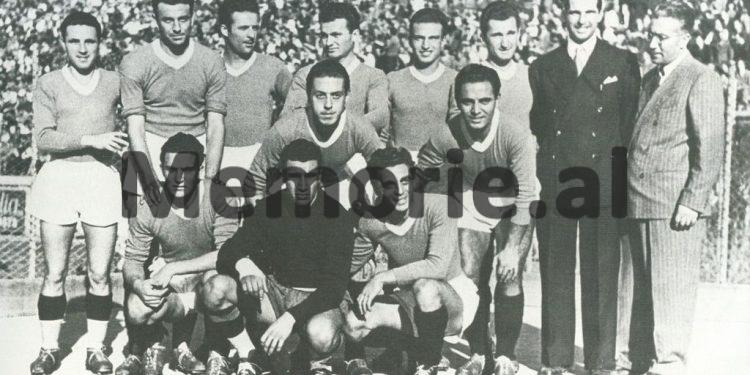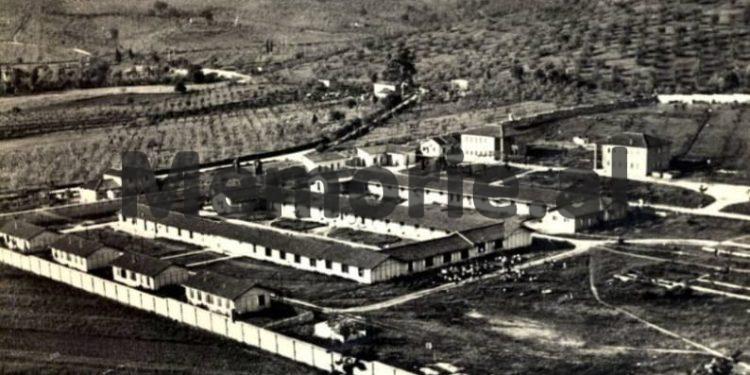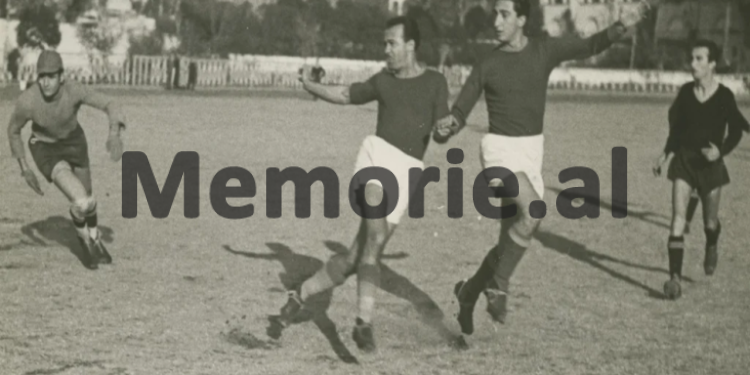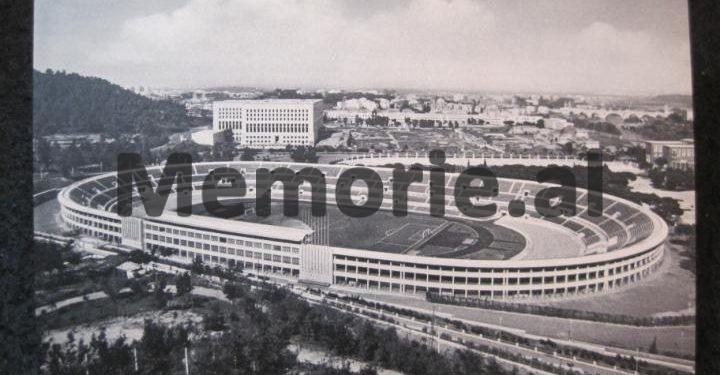By Dashnor Kaloçi
– The historiography of the communist regime never recognized that match, as our national football team was represented by ballistas and birders, accused as; “war criminals” and “enemies of the people”!
The first part
Memorie.al / On this eve of the match of our national football team with the Italian representative, which will take place on Saturday, June 15 at 21:00, the arena “Signa Iduna Park”, in Dortmund, not only those hundreds and hundreds of Albanians who they will be lucky enough to follow him from the steps of the stadium, or hundreds of thousands of others from all over the world through the TV screen, but even many of the sports journalists, researchers, historians, statisticians, etc., do not know that; in addition to those four meetings (two official and two friendly), which the Albanian national team has had with its neighbor across the sea, Italy, several times World and European champion as well, there was another match, when, an Albanian national team, developed at the Lazio stadium in Rome, a full 79 years ago, in August 1945. This fact, that is, a match of an Albanian national football team against an Italian team, even one of the strongest in the Serie A championship at that time, as was Lazio, comes through the rare testimony of one of the main protagonists of that match, Arif Peza, former footballer of the “Shprefeja” team of the capital and also of the Albanian National Team, from the period of the country’s occupation, 1939 – 1944 .
Somewhere from August 2006, when we met him, he was the only former football player of the pre-war Albanian national team, who was still alive! Even with a brilliant memory to be envied and also from the state of health, even though it was close to the 90s. Arif Peza, of early origin from the well-known village of Tirana, from where he inherited his surname, who in the late 30s, studied at one of the military schools in Italy, at the beginning of the years 90s, he returned to his homeland, to his hometown, Tirana, from a long emigration of almost half a century.
In 1940, after returning from Italy, where he was interned in a camp in Santa-Fara, for the reason that he had not agreed to take the oath as a military student in front of the Italian flag, he became active with the well-known football team of Tirana, baptized with the name “Shprefeja”, which was also the core of the Albanian national team, in those years of the fascist occupation of the country.
Two years later, he was forced to abandon the green fields and also his passion for football, after he went to the mountain with a gun in hand, even being the commander of one of the armed detachments of the nationalist organization “Balli Kombëtar”, which operated at that time in the villages in the western area of Tirana, such as Peze, Vorë, Preze, etc.
Political circumstances forced him, in November 1944, to leave Albania and settle in the camps of Italy, (which UNRRA had just opened), together with many leading nationalist exponents of the “National Front” and “Legality”.
Even though in extremely difficult living conditions for us and foreigners, both economically and politically, he and some other friends, former football players of the Albanian national team during the period of the Monarchy and that of the War, (1939-1944 ) did not easily forget their passion for football, which they started as children, when they played barefoot in the alleys of Tirana, just like all other peers of that time and later.
Thus, in August 1945, they organized a football match with the well-known Italian team of Lazio, in Rome, which Arif Peza would tell us in detail, in an exclusive interview, which we are publishing in full. in this article. In the same way, he put us in a position to publish, even some of the rare photos of that meeting, which never saw the light of publication before the 90s, since communist historiography could never allow the National team to football, to represent “war criminals” and “enemies of the people”, as the communist regime of Enver Hoxha and his successor, Ramiz Alia, had labeled them for almost half a century.
Arif, under what circumstances did you find yourself at that time in Italy, participating in the football match against the Lazio team?
In the middle of November 1944, I, together with some of my friends, who during the period of the occupation of the country (1939-1944), were organized and acted as part of the nationalist forces of the political organization “Balli Kombëtar” and “Legalitet ”, fighting with weapons in hand with their squads, against the invaders, to escape the revenge of the communists who were coming to power, we were forced to leave Albania.
We fled the homeland, together with the main leaders of these nationalist organizations, such as; Abaz Kupi, Mit’hat Frashëri, Hasan Dosti, etc. After we arrived in Italy, with the help of the Anglo-American forces, we Albanian political immigrants were initially settled in various camps in several cities and provinces of Italy, which UNRRA had opened, such as; Reggio-Emilia, Santa-Fara, Bari, Santa-Maria di Leuca, etc.
Who was the originator and organizer of the football meeting you held with the Lazio team in Rome?
The main ideator of that match was Halim Begeja, one of the main leaders of the nationalist youth organization “Balli Kombëtar” of Tirana in 1943-’44. During the many conversations that we had with each other at dinners in the camp of Santa Maria, it occurred to him and the rest of us welcomed his idea very well.
In those camps we were completely free and could move from one place to another without anyone stopping us. After Halim’s idea, we started to prepare the list of players who would participate in that match, making the relevant announcements, for each one, according to the possibilities we had.
How many of the footballers of “Shrefsa” of Tirana were in Italy at that time?
There in the Santa-Maria camp, from the players who were once activated with the “Shprefeja” team in Tirana, there were four footballers; Halim Begeja, Akil Derani, Mejit Dibra (Xhaferri), and me.
But even though there were some other ex-footballers who were in some other camps in Italy, we had a very difficult time announcing them and also preparing a team that could handle the match with Lazio, which we thought and envisioned to develop.
Based on this fact, we appealed to some other former Albanian footballers, who were once active with the teams of the capital, Shkodra, etc., who at that time were studying in Italy, Austria, etc.
How did they receive your invitation, did they agree to come for that match?
They welcomed our invitation with great pleasure and were very willing to come to Rome, where we would play the match with the Lazio team.
Thus, after their confirmation and positive response, Halim Begeja contacted some of his friends who lived in Rome, such as Lin Shkreli, etc., who talked to the leaders of the Lazio team, regarding our request to develop a match with them.
The leaders of the Lazio team, which at that time was one of the strongest teams in Italy, immediately agreed, and also set the day and time, when the friendly match with our team, which we had baptized with the name, would take place; “Team of Albanian Students”.
We chose this name in order not to give it political overtones, since at that time in the Italian government of De Gasperi, the communists of Palmiro Togliatti had a lot of influence and also influence in the government of Enver Hoxha, which had revealed to us as; “war criminals” and “enemies of the people”, he had forbidden us to return to Albania.
Who were the other former footballers who agreed to come and play in that match?
Everyone responded to our offer to come and participate in that match, even with great pleasure, except for Niko Dovana, (the famous goalkeeper from Durrës), who at that time was in Italy due to problems business and trade, as well as Riza Lushte, who at that time was active with the Italian team in Alexandria and was engaged there.
While the other former footballers who came and were active in that match against the Lazio team, were; Kol Mani (goalkeeper, originally from Shkodra), Bik Deda (Shkodra), Bik Shestani (Shkodra), Eqerem Arapi (Tirana), Sabaudin Biçaku (Elbasani), Haki Korça (Tirana), Naim Kryeziu (Kosovar, originally from Gjakova ) and Reshat Biçaku, originally from Elbasan.
All these footballers, together with the four of us, who were in the Santa-Maria camp, with some minor exceptions, were all former members of the Albanian national team.
Who were or were considered the best players of the team you were forming at that time, for that match with Lazio?
Among the strongest points as footballers, of the team we formed, which, as I pointed out above, was a national team of Albania, were Naim Kryeziu, (who at that time was active with the basic formation of the Rome team), Sabaudin Biçaku, (who played with the V.I.S.A Voghera team), as well as Haki Korça, who was active with the reserves of the Lazio team, when Loro Boriçi played there.
After the participation of all the football players I mentioned above was confirmed, we decided to meet in Rome, where Lin Shkreli, who as I said was originally from Shkodra, was waiting for us.
How many days before the match did you go to Rome, where did you get settled and did you have the opportunity to train any day before the match with Lazio?
We went to Rome a week before the date we were going to hold the match (at the end of August 1945), where Lin Shkreli welcomed us. Halim Begeja, Akil Derani, Mejit Dibra (Xhaferri) and I, who were in the Santa-Maria camp, traveled by train to Rome, where we also met the rest of the team, who came from different cities.
All of us settled in the “Rusikum” complex, which was a Catholic religious institution, where an Albanian priest, Father Zef Valentini (well-known scholar and historian), had prepared all the conditions for us to keep us there for a week, (without any expense on our part), accommodating us with sleeping, eating and also provided us with the red and black uniforms of the Albanian National Team.
For a week in a row that we stayed in that religious institution under the care of Father Valentine, who was a man who was doing the impossible for his fellow countrymen, we trained every day, in the premises and training fields that he had set up for us available with all the necessary conditions.
Where did that match take place and what do you remember from it?
The meeting between us and the Lazio team took place at the Rome stadium, according to all the predictions we had made, that is, on the day and time specified, which was also announced with posters around the city, as it happened with the official matches held that team.
About four to five thousand spectators had come to the stadium that day to watch the match. In that friendly match against us, which was to be judged by a trio of referees from Rome, with the Lazio team, the famous player, Puccinelli, who played as a left winger and was one of the strongest points of the Italian National Team, was also activated. . Apart from him, Lombardini and De Andreis were also among the strongest points of the Lazio team.
How did your team perform against that well-known Italian team?
Although our team was very modest and did not have proper preparation and training, we were able to face that match with dignity, playing a good game.
We even scored the first goal through Akil Deran, in the first minutes of the match, and then the Lazio players went on the offensive, scoring several goals in our goal, protected by the Shkodran goalkeeper, Kol Mani, who unfortunately, it was one of our team’s weakest points.
What was the final score of the match?
The match ended with a deep score of 10 to 1, in favor of Lazio, but it must be said that our team’s game was well liked, both by the local fans, who had filled the steps of the stadium, and by the hundreds of Albanians who had come that day, to follow our match.
After the end of the match, the leaders of Lazio and the whole team gave us a cocktail reception inside the stadium, where, among other things, they thanked us for our visit.
There we spent some pleasant moments in the company of the local team and also our compatriots, who did not leave us for a single moment.
After the welcome they gave us, our whole team stayed another three or four days in the company of Father Zef Valentini, who took us on a tour of some tourist spots and places in Rome.
Then we went back where we came from, parting with tears in our eyes, as it was not known if we would meet again, with each other. Memorie.al
The next issue follows




